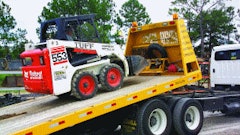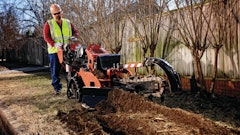Just when I thought a reputable contractor "had it all together," he screwed up on some of the "little" things. He seemed to forget all the basics of performing work that met the minimum standards for quality, safety, and customer service. It reminded me of how important it is to pay attention to the little things we do in our business.
Stress management experts suggest that we not worry about the little things in life: "Don't sweat the small stuff" we are advised. But most construction owners will tell you, "If you don't 'sweat the small stuff' you may not have enough of the large stuff to keep you in business."
Yes, successful contractors do sweat the small stuff. It is the little things that separate the winners from the rest of the pack. Successful contractors also prepare systems and processes that consider the small stuff, ensuring that they are addressed, completed and perfected.
Before I share with you several things you should "sweat" recognize that the difference between the average, even good contractors and those contractors who are spectacularly successful is the degree of sweating the little things. Outstanding contractors are almost obsessed with doing everything right, the first time. From making phone calls, to arriving to the job site on time, to keeping the project site cleaner than it was prior to the job start, contractors who will gain the better work in a market place will simply be better and better focused on the little things.
Let's define eight little things that every contractor had better sweat.
- Call the customer before showing up at the work site. Calling ahead to confirm your arrival reminds the customer of the work contracted to be completed. It is not only a professional technique that should be incorporated into your contractor's "gang box" or resources; it may prevent customers from saying "I forgot you were coming."
Simple rule: Call one business day before your work is scheduled to begin. - Do a final walk through. Never leave a job without one last walk around the job-site. Smart contractors have a detailed list of items that are to be completed on every job, including specific requests by the customer. Don't let the final walk-through be nerve wrecking. If you are keeping your own fingers crossed because you're not sure what shape your crews will leave the job site then you don't have enough safe guards, quality processes and right decision makers in place on the job. If there is doubt, then address those doubts now and get past this or risk never really enjoying the greatest success that you were meant to experience.
Simple rule: Complete your job walk through before walking the job with your customer. - Use professional traffic control and safety markers. Marking off an area with empty buckets and a roll of orange flare tape does not demonstrate professionalism. Using barriers with appropriate reflectors and other safety items projects a professional, organized approach. If you are going "vertical" then be sure to clearly block off areas that have not had stairs built yet or other areas where even a simple fall could easily lead to sprain or broken ankles.
Simple rule: Invest in and use only professional traffic control and safety tools and techniques. - Prepare the map and traffic control instructions for the customer. Create the map with the appropriate traffic instructions and give this to the customer. This shows your organizational skills and is one less "little" thing customers need to worry about.
Simple rule: Include a traffic control supplement upon final bid acceptance. - Provide a personalized, hand-written note of thanks to the client at the conclusion of each project, no matter how big or small. This oldie but goodie customer service technique builds repeat business. Take the time to pen a sincere thank-you message to your clients. In this day of computers and e-mail, hand-written notes are even more noticeable...and appreciated.
Simple rule: Make your hand-written thank you notes standard operating procedure. - Match final invoice against original proposal with any change orders. This minor administrative mistake can lead to major customer relations problems. Matching the final invoice to the work proposal forces everyone involved with the process to document every change when ordered.
Simple rule: Final invoice = documented proposal + change orders. - Strive to always know and use only the correct name, spelling and contact information for your customers. This may be the biggest of the little things. Every customer wants to be recognized and respected. Spelling a customer's name correctly is the easiest form of respect to exercise. Maintain day and night time telephone numbers, including mobile and pager numbers, and e-mail addresses.
Simple rule: Obtain all needed contact information and make part of customer file. - Never promote a surprise with your customers. Construction companies are often quick to do things the way they think things should be done, not always contacting the customer first. For example, a contractor's crew might just go ahead and add a few more feet of wall or raise the windows just a half an inch from the original specifications, thinking that they'll surely be able to move this little change past the customer. Remember, taking the attitude that it is "better to ask for forgiveness than permission" might work some of the time but it rarely proves profitable when making self-decided changes to what a client wants or wanted.
Simple rule. Always seek the clients input and confirmation before your crews make changes.
This is certainly not all of the little things you should remember. However, keep in mind that most customers believe quality includes not just the final results, but the little things you did along the way. So, "sweat the small stuff" - it will keep you in business and separate you from your competition.


























